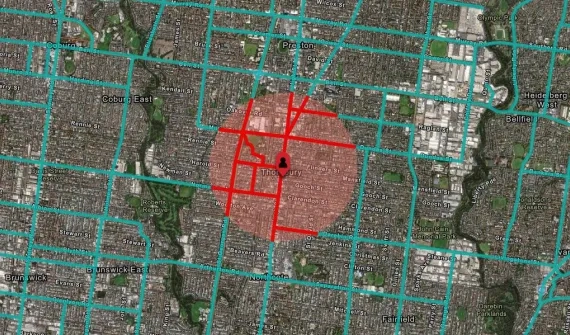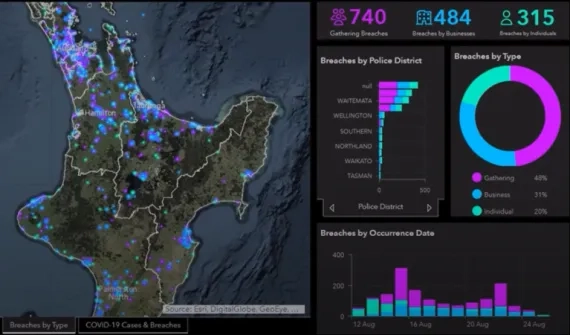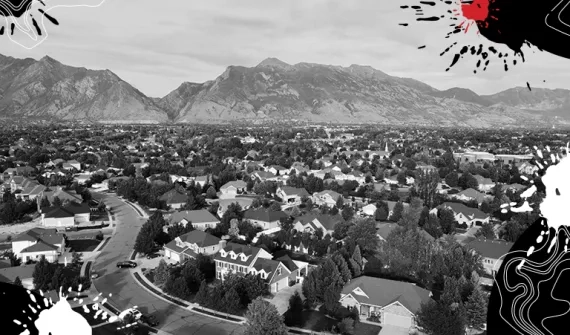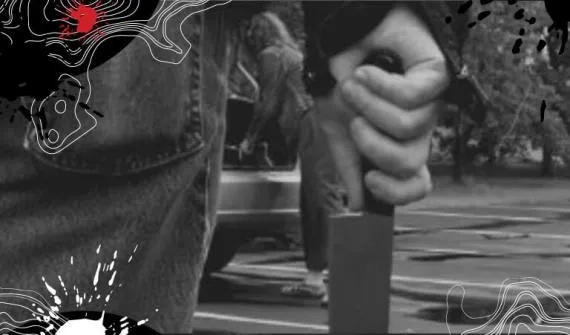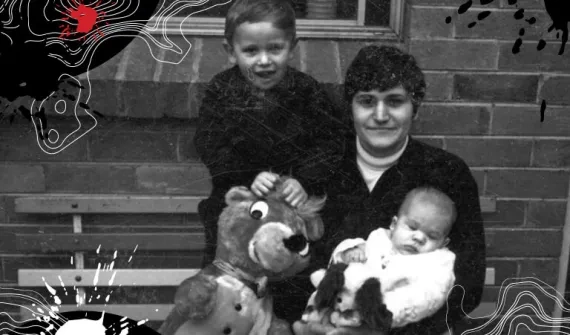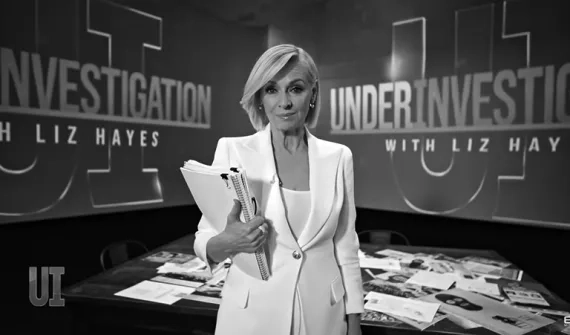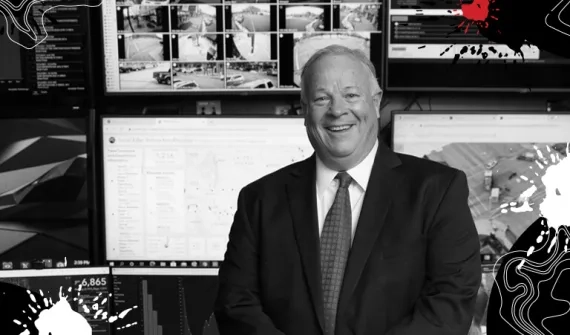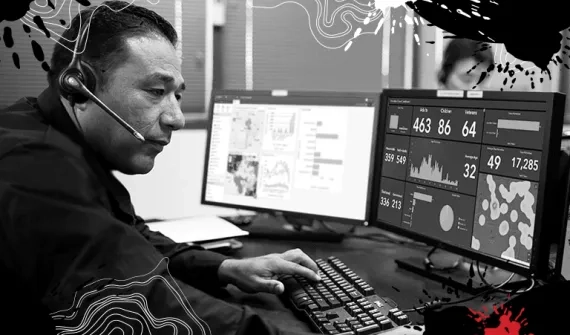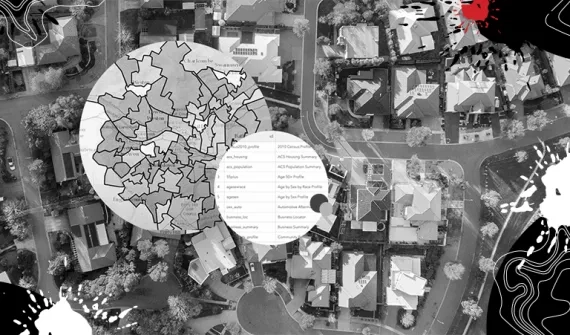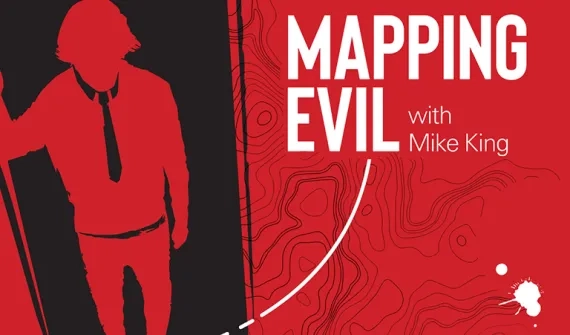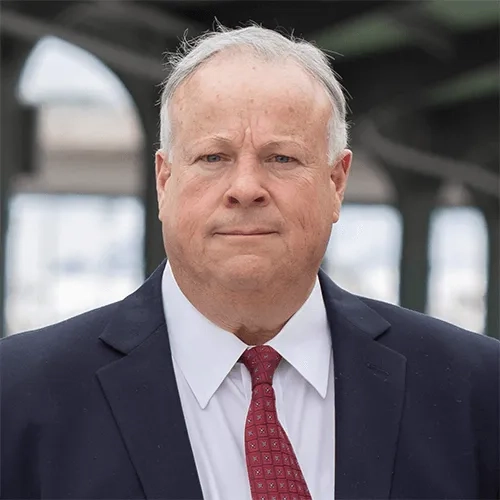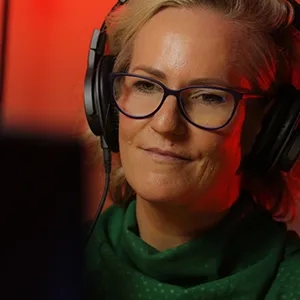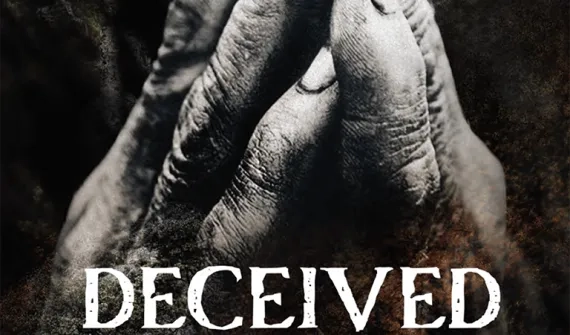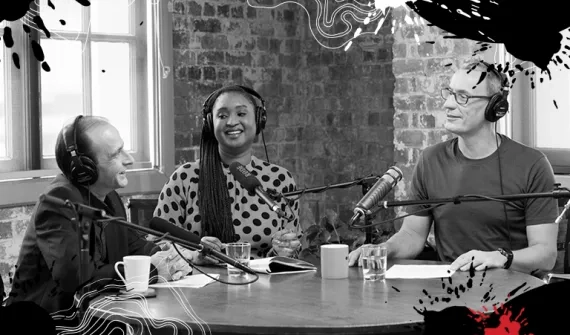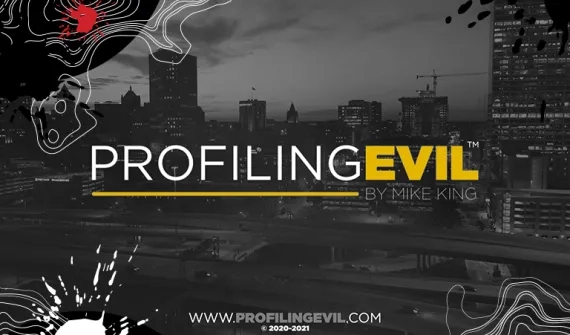Mapping nature or nurture
When does a faith built on love and compassion transform into the darkest of beliefs? What is the catalyst that takes a devoted parishioner on a journey to become a prophet, and then a predator?
In this episode, Tory Shepherd and Mike King take a closer look at crimes committed in the name of God. They explore the malevolence of Utah’s Lafferty Brothers and the appalling deeds that had many questioning whether their crimes were the acts of diseased minds or the product of a cruel upbringing. Mike discusses the tactics used by modern-day law enforcement agencies to now track and combat the spread of religious teachings that show the same characteristics as an insidious killer virus.
Tory then challenges Mike to use those same investigative tactics to shed new light on the Australian cold case murder of beloved mother Maria James, whose brutal slaying remains shrouded in mystery. Mike jumps into the details of the crime and, as is always the case with this seasoned investigator, nothing is off limits – including a scandal involving Maria’s local clergy.
Join Tory and Mike for another compelling journey into the dark side of humanity.
He said, ‘I'm going to just go in and slit their throats. In the Bible that's the way they got rid of people - by the sword. And that's what we need to do. I'm only doing what God told me to do.’
The firsthand account of a convicted killer
In a special bonus episode of Mapping Evil, Mike and Tory revisit the macabre case of the Lafferty brothers (Episode 8) – a truly disturbing story of religious fanaticism and ritualistic murder.
Nearly 40 years on from the gruesome slayings of new mum, Brenda Lafferty and her daughter Erica, Mike shares candid interviews with convicted killer, Dan Lafferty and his brother, Ron – a self-professed prophet. Hear from the killer himself as he casually steps through that fateful day on July 24, 1984.
Listen as the brothers describe in chilling detail how the full horror of Ron Lafferty’s sadistic doctrine came to be unleashed on an unsuspecting mother and her 14-month-old child.
Though unsettling, these interviews provided vital information on religious fanaticism and cult activities that improved investigative techniques across the United States. Through Mike’s involvement in the case, more than 1,500 violent crime investigators heard firsthand how these vicious groups are developed, cultivated, and mobilised.
“I’m not ashamed of it, I’m not embarrassed by it, and I may speak of it so calmly that it might unnerve you a little bit but, to me there was no emotional involvement in it.” – Dan Lafferty
Discover more about crime mapping
Never miss an episode of Mapping Evil – subscribe now.
About the hosts

If you have information about any unsolved crime or suspicious activity, then you can share what you know with Crime Stoppers, without saying who you are or getting involved. Call 1800 333 000 – or go to crimestoppers.com.au.
- Click to view the Plotting the Path from Prophet to Predator transcript
Tory: The following podcast contains content of a highly graphic nature. Listener discretion is advised. The material covered is based on firsthand accounts and publicly available information. In producing this podcast every effort has been made to show respect to the victims and their families support for this episode comes from the country's leading mapping technology and services provider, Esri Australia. To learn more about how Esri tech is making a difference in crime analysis and public safety, head to esriaustralia.com.au/crime.
I'm Tory Shepherd. And this is Mapping Evil with Mike King.
If you're a regular listener of Mapping Evil, you'll know we always give a graphic content warning – but today's episode may be particularly distressing to some, as it includes a case involving violence against a child. So as always, we recommend listener discretion.
Mike [voiceover]: He said, “I'm going to just go in and slit their throats. In the Bible that's the way they got rid of people – by the sword. And that's what we need to do. I'm only doing what God told me to do.”
Tory: This is a true crime podcast that explores the geography of crimes and killers.
Mike [voiceover]: He says, “Ron, I'm the voice of God, but you are the arm of God. You're the one that gets to do the dirty work. I just tell you what to do.”
Tory: Episode Eight: Plotting the Path from Prophet to Predator.
Mike [voiceover]: It is about contact tracing. Where do people come into contact with each other? What's the association between them? And what's the relationship between one point on the map and another point?
Tory: Throughout history, religion has been used by predators to justify crimes – especially killers who believe they have a personal connection to their gods. But how do people end up like that? Are they born that way? Or is it their surroundings, the location where they live, the demography of the people around them that contributes to these extreme beliefs?
Mike King is an expert on this topic and has been responsible for catching some of America's most notorious religiously motivated criminals. He even as his own YouTube channel called Profiling Evil which is definitely worth checking out.
In this episode, we're delving into his incredible knowledge bank to explore religious fanaticism and how the rituals of people's religion and belief systems influence their criminal behaviour or help to disguise it.
Mike: It is a really peculiar kind of murder and murderer that gets involved in ritualistic style killings. It boils down to looking at the case from a fundamental standpoint. First, examining it as a homicide, but then looking at the ritualism as more of a contributing factor or an aggravating factor to these kinds of murders.
Tory: A very well-known ritualistic killing from the United States that we'll take a closer look at today is the Lafferty brothers. You were closely involved with these guys, right? You actually got to know the brothers, or at least Dan. Talk us through what they did and how they tried to justify it.
Mike: The thing that was interesting about the Lafferty brothers is they started out with maybe altruistic feelings. They were wanting to be leaders in their local church congregations – and that wasn't working out because obviously there were character deficiencies. They came from a family that pushed religion as a very big part of their lives. They went almost a little bit overboard in religion within the family.
But when the boys didn't get the accolades that had they hoped for, they had to go out and start creating their own kind of a religion. Through that process, they then started creating revelations that they purported came from the God that they believed in – and those revelations led them to committing homicides.
Tory: The revelations were things they wrote down that predicted what was going to happen in the future.
Mike: It's crazy, I've dealt with cults and ritualistic cases for much of my career and it's always interesting because suddenly when they can't satisfy a passion that they have legitimately, they use God as the justification to take the responsibility of the act off them. ‘I'm only doing what God told me to do’ – which is absolute malarky.
Tory: Of course. They started out as religious zealots and then became so extreme they were ex-communicated from the Latter-day Saint faith for their beliefs. They went on to become absolute extremists using religion as an excuse.
Mike: The interesting thing is they took something good and turned it into a cancer – using it as a weapon to not only get control, but to justify their acts, which were criminal.
Tory: Now we're getting to – I hope this doesn't sound too lurid – but the guts of the matter. Mike, talk us through where this ended up – the crime that this all culminated in.
Mike: As the Lafferty brothers narcissism continued and magnified, they created a little church of their own and they started building followers. They had people that were believing them and listening to them. And they used an old Canon of text from their faith that they had previously belonged to and created something that they called ‘the school of the prophets’.
They said this was a training ground for them, and more importantly for Ron – who was the self-proclaimed leader of the group – to train other people. This included attempts to recruit their younger brother Alan.
There were some really interesting things about Alan because he loved his brothers. He looked up to them. He started to mirror and mimic many of the things that he was watching his brothers do – and this just infuriated his wife Brenda who knew that these two were crazy. Thankfully she demands that he stay away from them.
Tory: So Brenda goes ‘hang on a second. I'm not entirely sure that you are prophets sent from God’. She challenged their beliefs.
Mike: Yeah, that's exactly right. Imagine how that infuriates these self-proclaimed prophet and from a woman no less – because they felt that men had a higher priesthood power than women would have. In order to keep control of her, they demanded that her husband Alan get control and tell her to knock it off and to settle down.
This was a strong-willed, independent woman who had a college education. She was successful and she wasn't going to put up with it and she demands her husband back away.
As we see in many of these cases, Ron – this self-proclaimed leader – then receives revelation from God that she needs to be controlled. The way he thinks she needs to be controlled is through a revelation that he calls the 'removal revelation' or the 'removal document' – which in essence, gives him the authority or gives him the orders from God to have her removed. That's why they called it the ‘removal document’. Just get rid of them, just get them out of the way.
Tory: Can you tell us a bit then about the actual crime – because there's a bit of confusion isn't there? One of them claimed to have killed both Brenda and her daughter – which we'll talk about a bit – but that might not quite have been right.
Mike: No, actually it was accurate. And I get that from the horse's mouth – the one who did the killing. The thing that was interesting in that case is once this removal document came into play. Remember, Ron believes he's a prophet of God and he has proclaimed himself as the voice of God. He then tells his younger brother, Dan – who idolises Ron the prophet, like his younger brother Alan – he says, “Ron, I'm the voice of God. But you are the arm of God. You're the one that gets to do the dirty work. I just tell you what to do.”
Tory: How convenient.
Mike: Isn't this great? ‘I don't have to get my hands dirty. But you know what? You're really lucky because God wants you to do whatever I bid you to do.’ And Dan then says “Well, let me think about this.”
Dan says, “I got a pretty good feeling. I'm not getting a no, and I'm not really getting a yes.” And again, Tory I'm telling you exactly the words that this killer told me as we sat in interviews together. And he says “All right, we're going to do it.” And his brother says “well, how do you want to do this?”
And he says “Let me think about this for a minute. I got it. I'm going to just go in and I'm going to slit their throats. That's the way they got rid of people in the Bible– by the sword. That's what we need to do.”
Tory: Listeners, I'm just going to hit pause for a moment here to let you know that coming up in my conversation with Mike are some details of the Lafferty brothers crimes, that could be very hard to hear.
Mike: Once they've concocted this plan, they get two other guys that they pulled into this school of the prophets and this wacky belief system they've created to serve as drivers and sentries while they go into the home – a guy named Ricky and another one named Chuck. They drive up and they pull up in front of Brenda's home.
There's some really troubling things that happened in this case that still bother me to this day. It's interesting to me that the brother happens to be away on holiday. He leaves home, and goes to a job site and happens to be gone during the day.
He also does something really peculiar just before the murders occur. Alan calls his wife and he wants to know what she's wearing. She indicates that she's doing the wash and she's just wearing her bathing suit with pair of shorts pulled on over the top of this suit.
They come into the home and immediately a fight breaks out as Brenda tries to get them out of her home. Of course she knows that this is really bad. Dan talks about how there was a struggle and eventually they cut the cord off of the vacuum with a large filleting knife and they wrap that cord around Brenda's neck until she passes out.
At that point, Dan then goes into the bedroom and he speaks to the baby for a few minutes. In this conversation he's saying, “Hey, little one. I don't know why you need to go, but you got to go.” And then he grabs and executes the child with the knife to the throat.
Terrible scene. He walks away, and then goes into the other room. This is where some of the confusion came, because Ron helps with getting Brenda tied up with this vacuum cord, but then they remove the cord from her neck and then Dan takes her life.
Once they leave the home, they get in this station wagon and drive past the home of a ecclesiastic leader that they had intended on killing. But they're so engaged in conversation about the murders that they had just committed that they completely drive past not paying attention. So that guy avoids becoming a victim to this crowd. They then go to the home of their next intended victim – and thankfully she's not at home. Frustrated they get in the car and as they're driving away, Dan turns to Ron and says “I guess, God didn't want those two killed.” And he said “Nope, I guess not.”
Tory: Once again, there's a convenient explanation for things they've done – in this case stuffing up more intended murders – and then they go on and get caught in quite a strange place.
Mike: Yeah, it is so strange how the deity in their life works. They are driven to head to Nevada to a casino – and it's in that casino that they actually are finally captured.
Tory: So they're busted, but that's kind of where the story begins in a sense for you because you do a lot of work getting inside killers’ minds, and you ended up getting to know Dan and then using him to teach other law enforcement investigators about how he thought.
How does it help you listening to a guy like Dan, talk about his crimes?
Mike: It immediately makes you think. Number one about the mental stability of someone that can do this. That became an issue in court of whether they were mentally capable of even being able to be prosecuted – which they quickly were found capable. Because in everyone’s books, you'd have to be crazy to do something like this.
What the prosecution and law enforcement were able to show is that they methodically put these murders together. They methodically acted them out and evaded police and capture. Those are the kinds of things that show that they understand what society's norms are and what is right and wrong, but that they chose to do it anyway – which led to them going to court and being prosecuted.
Tory: Then you got to hear straight from them how they thought about these things. Dan was able to talk you through his conversations with Ron in front of that room full of law enforcement officers. I guess that really helps them understand the strategies. Does it also help them understand that moment where they move from just fantasising about something into actually taking action?
Mike: Yeah, we talk about these crimes as investigators based on our experience – trying to break down the case, understand what elements are involved, and then trying to get confessions. We can theorise all day long about what motivates a killer.
Now imagine because of a situation like this, we had 500 investigators in this classroom or auditorium when Dan spoke to them and now you have the actual predator coming in and talking about what their belief system is, what motivated them, why they did things the way they did and in the order that they did.
All of these can help us to vicariously ‘roll in the dirt’ and experience this crime like they would experience it. Then we can start to apply legitimate kinds of feelings that we all have against these illegitimate kinds of activities and start to better understand how this predatory mind thinks. We're going right to the horse's mouth to get the information.
Tory: That brings us a little bit back to nature or nurture as we're trying to understand how these people unravel. Tell us a bit about their upbringing – the two brothers, Ron and Dan obviously turned evil and it doesn't it sound like the younger brother was a good egg either. What was their home life like when they were growing up?
Mike: We talk about victimology a lot but it's important that we do exactly what you're asking. We look at the suspectology or study the life of these people who were suspects.
These boys were raised in a pretty large family with a father who was very strict and very abusive. In fact, at times the abuse was so violent that their father even went as far as killing family pets in front of family members to assert and send the message that he really is the one in charge. That's a terribly big red flag.
Imagine being raised in that environment as a child and then eventually mimicking those same kinds of behaviours. Their father was a constitutionalist – or a person who believed in the United States constitution or the founding basis of the country – and that all new laws or all new taxes are all just an aberration of what was originally intended. He constantly was fighting against taxation, against things like modern medicine and other kinds of things.
Mum was a little wacky herself. I remember one story in particular that was troubling because this is a woman who placed Ron as kind of the head of the household. She really spent more time in a relationship with Ron – we have nothing to suggest that there was anything intimate going on, but she put him more as the head of household.
Dan recites times how his mother would hang a needle from a thread and the family would sit around the table after she had prepared the dinner and then – similar to a Weegee board – she would let the thread and needle swing back and forth to tell him what would be served first and in what order based on whatever was happening with this thread swinging back and forth. So there were a lot of wacky things going on in that household.
Tory: They were primed in a sense to take to extremist worldviews.
Mike: If we go back to where we started, nurture or nature – as a profiler, we look at these cases and we really have to look at the behaviour at the scene. We have to look at the fact that they understood what society's standards are and that they choose to violate them and hurt people.
Tory: Alrighty. Let’s look at how this plays out. They're religious zealots and use religion as an excuse to carry out their righteous anger – but you want to look at the broader network, don't you?
They're building up a following, they came out of this family that had its own quirks – how do you start to look at the network that's left? Especially when they leave behind something like a revelation or a manifesto – you have to worry about the people who are still running around free, who might be reading that.
Mike: That really is the thing that's so troubling to me. I worry less about the leader of a group than I do the follower who wants to prove their allegiance to the leader. Dan and Ron are perfect examples. Ron says, “I am the voice of God”. And Dan assumes this position “well then I'll be the arm of God to act out these things, and prove how devoted I am to you.”
This is really typical of cult practices. They work very stringently at the leadership level to give the followers meaningful responsibilities that somehow give them a sense of purpose.
Tory: Right. Let’s talk a bit about what you'd do today, because we have all this extraordinary technology now to map how these networks build up and split off.
If you could tag people who gave signs of being extremists, how would you work at it today to make sure that once Ron and Dan were off the scene, no one else was going to follow in their footsteps?
Mike: Yeah, that's great because we're now 30 years later trying to understand what we would do differently. Today we would certainly spend more time understanding what's being socialised on the internet. We'd want to get into things like those manifestos and other things where we can better understand what's motivating and what the belief process is for these individuals.
Then we can start to look at things geographically and we can start to link together who all of the associates are and create rich link analysis charts that show us where individuals are originating, where they're ending up, and how are they getting from wherever they live to this cult and participating in this organisation.
Once we do that, then it really boils down to what do we do from that standpoint of ‘good old-fashioned detective work’ where we get in and start following leads. We identify where people are buying things, where they're selling things, even as simple as where they're getting fuel everyday or when they go for their cup of coffee in the morning, so that we can start to understand the behaviours. Once we start to understand those behaviours and look at them geographically, it starts raising a whole bunch of questions that deal with things like temporal kinds of decisions or evidentiary kinds of things.
Tory: Mike, as we record this, Coronavirus is still raging around the world and it just strikes me that tracking the spread of viral ideas is not too dissimilar to what we're doing now. Where have they been? Who are the close contacts? How much time do they spend with that person? What was their behaviour like?
Mike: Yeah, that's perfect because it is about contact tracing. Instead of looking at where a virus is transmitted, it's where do people come into contact with each other. What's the association between them and what's the relationship between one point on the map and another point?
Tory: I'm going to take you from where you are right now, all the way to Australia and a cold case here that seems to have all the markings of a ritual killing. It seems to be a very cold case. We're going to go through some big unknowns and mysteries about this.
Maria James was stabbed 68 times. She lived in the back of a Melbourne bookshop – and Mike, this is your bag because it's a real cold case. I feel like people who follow true crime cases might think that sounds like a crime of passion. All that stabbing is often what you hear about when someone's really personally involved.
But when they looked at it, it does look like maybe somebody inflicted a ritual punishment and authorities at the time thought it might've been religiously motivated.
Mike: Yeah. This has been a really interesting one to study. Experience shows that when there are multiple stab wounds, there is this indication that there's personalisation. It also is indication that there might be incredible disorganisation – that the offender just really may be messed up.
It's so important that we start to understand what the relationships are, what the victimology is and the possible suspects to try to determine if there are relationships that bring them closer together.
We've got to look at things like the location of the wounds and in a sadistic sexual case, we might see focus on things like the genitalia. In other kinds of cases, I've seen horrendous stab wounds that are just confined to the face and there are peculiar reasons why that happens.
We sometimes jump to conclusions before we really start gathering all the facts – and that's been one of the exciting things in this case is that there are a lot of things that today even could be investigated further.
Tory: Well, yeah as you're talking, I was thinking about crimes of passion. You know, you immediately think of a spurned lover or something like that, but a crime of passion could equally be connected to religious passion in the killer's mind – the same kind of anger or revenge that leads to something getting completely out of control.
Now here in Australia – I mean, it happens all around the world but it's been recent here –we've had big investigations into abuse in church institutions. There's a suggestion that while it could have been straight religious motivation that led to this crime, it could also have been some kind of cover-up and maybe even a combination of both.
Mike: Yeah, that's why we need to be so cautious when we look at these that we first gather facts before we start putting out theories. This idea of deciding one way or another can be problematic because we would spend all of our time trying to twist true facts to fit whatever theories we have. I think there's a real interesting piece to this case that could also be disorganisation.
It could have been that once someone started stabbing, they just lost all control like a Tasmanian devil. Now that's probably not a fair thing to say to someone in Australia. We call it that because of that frenzied way in which the little cartoon character – the Tasmanian devil – would just spin out of control and do things. We see this happening in crime scenes.
It becomes a challenge for law enforcement to start to pick apart the case and understand if it is disorganisation – and there are other things that would lead to help us understand whether there's disorganisation – or if it is a ritual killing where there are specific kinds of things happening. Is it exploratory in nature? There's just so many questions that are hard to answer when we're looking at it from the 30,000 foot level.
Tory: Tell us about the connections between Maria and her local clergy.
Mike: That was really troubling to me as I looked at that because the local clergy were actually helping the mother with a handicapped child and there is evidence to suggest – witness testimony, including testimony from the child – that this clergy was going to be reported and that the mother Maria was planning on reporting the clergy member that particular day.
Now I wonder if the phone call that she was making to her husband or that he was returning to her had something to do with that declaration. Was the visitor that was in the house actually someone who was associated – the clergy in this case – or was it just the bogeyman who happened to get there at the right place and right time?
Tory: Mike, you mentioned the phone call and I'm really interested to hear a bit more about that and how it fitted in to the way the day panned out because the events can be a little confusing.
Talk us through the phone call and the series of events after that before the body was discovered.
Mike: I wish I knew more about that. I would love to have the opportunity to re-interview the people involved in this case. The ex-husband apparently had a pretty good relationship with Maria and they were doing a good job of dual-parenting. At least that's what I'm assuming based on what I've read.
I find it interesting that the ex-husband hears what he believes is an argument and instead of immediately calling the police, he gets in his vehicle and makes the 15-minute drive down to the scene. Then of course there are some conflicting things that I just don't know if it's because I've read conflicting news reports, but he then has a difficult time getting into the house.
He finally gets inside the home and finds his ex-wife murdered and laying in the back bedroom. This is peculiar to me because he then turns and leaves and goes to call the police. That creates a couple of questions in my mind.
It troubles me that the husband didn't use the phone in the victim's home. Rather he leaves the home and goes to make a phone call. Now maybe that phone line was cut and that information has never been made available. Another possible explanation is he may have even sensed that the killer was still in the house and fled to a position of safety to make that phone call. Either way, those are questions that to me need to be answered.
As we step outside, when I look at this on a three-dimensional map this home is – if I have my coordinates right – just North, less than a city block from the local church that the suspected clergy members attend and I assume live in. It's a pretty built-up area. It's not a quiet lane somewhere.
And so to run out and then run down the street to a place where he could make a phone call to police causes me some additional concern. I'd like to know how many businesses he passed or how many doorways he could have banged on to call for help. That really troubles me. By no means am I indicting the husband in this – it’s just these are the questions that come up in my mind as a profiler or an investigator.
Tory: How would you work that out today? We've got the killer who's presumably run out onto the street and the husband has run around and gone back inside. Now we have CCTV and so much more surveillance. How would you start putting together a map of what happens?
Mike: Today would be really nice. I assume that there are cameras around the businesses and in the parking lots, there are residential cameras. One of the things that we've done cooperatively throughout the States – and we're seeing now happen more and more in other countries – is that we're using mapping and GIS to also allow the public to register where their cameras are on their homes.
Of course we're seeing now the advent of cameras in doorbells and in light switches. So there is this huge network as part of this Internet of Things or mass amounts of data available that we could start collecting a lot of information that we never could have before.
I would want to know as an investigator back then, or today, about the parolees and probationers – people who were recently released from prison that might have similar kinds of crimes in their backgrounds. I'd want to know where they lived and start isolating those one by one.
I'd want to think about how much time passed between the husband leaving the apartment to call for police and police arriving on the scene – and see how far could someone walk in that amount of time – to start creating either a drive scenario or a walking scenario to start working backwards from. There's a lot we can do with GIS in these kinds of cases.
Tory: I want to know a little bit more about proactive policing. Now that we have all this information and data, what can you do to stop crimes as well as to track them down once they've happened?
Mike: A really powerful question, Tory. GIS allows us to map out and forecast events based on previous kinds of crimes and circumstances. Now a profiler will teach that past behaviour is indicative of future behaviour and by implementing this science of geography, we can gain a better understanding of what's happening around us.
As we gain this additional insight, we're in a much better position to respond appropriately. With some proper analysis a weather map, crime data, offender locations, victim demographics information can lead to clearer problem solving and frankly, problem analysis and resolution.
In essence, Tory, I guess the idea is that law enforcement agencies can lean on each other and see how other agencies are using GIS to impact the business of public safety. It's part of this trend that we're seeing that promises proactive strategies for proactive policing.
Tory: As always Mike, it's been a great chat today about murder and religious fanaticism.
Ordinarily I would say that's a wrap and we'll call it a day, but I'd like to ask you something it's kind of on a personal note. I'm a target for a heap of hate groups – just because I tend to annoy people quite a lot. With what you know about GIS and data, how would you go about looking at my victimology and how I could reduce my risk of being trapped?
Mike: One of the first things that all of us can do is assess the repetitive behaviours in our life. Are we always going to the same coffee shop every morning, ordering the exact same thing at the exact same time so that we show up at work at the exact same moment? Do we always try to park in the same spot?
All of these things that we do that are very habitual in the way that we're acting also create ways for predators to target us more easily. One thing we can do is think about how do we mix it up a little bit – ‘how can I take a different route to work once in a while’? We might actually have a little fun doing that.
The other thing is what are we doing with our experience of social networks and on the internet to protect ourselves? Are we opening emails that seem a little odd, but our curiosity is just killing us so we want to look into it? Are we responding on chat rooms to people that we don't know and creating relationships or sharing intimate information about where we went to school or how old we are or my brother's name is Billy? Those kinds of things also create weaknesses in our fortress of trying to protect who we are.
Recently we had a horrendous case in the States with Harvey Weinstein and the thing that kept coming up over and over is that he exploited these weaknesses and these desires people have to get something for nothing. That's the other thing is we really need to be cautious, if it sounds too good to be true, our parents were right. It probably is.
Tory: Always such wise words. And you're right about all the social media. As a journalist and particularly as an annoying journalist, you know, we go through all these processes, you suppress your address.
I had disabled all my location devices, and then I had somebody work out where I was by facial recognition and the location devices on a friend's phone if they took a photo of me. I had a pest who got all his followers to search for photos of me through reverse Google image search, just to pull them all together. It's really troubling.
Mike: That is such a good lesson to your peers and to everyone out there that there are things we're doing that we think are innocent that still are exposing us to others.
I watch people who find some sense of importance by having hundreds of Facebook friends or connections. By doing that, we continue to expose ourselves again to people that we don't know. And we really should be more cautious about that.
Tory: Mike we've been through the Lafferty brothers and right inside Dan's brain – and I hope I don't think about that for the rest of the day. Of course this amazing cold case in Melbourne, which I think I'm going to go and try and find some more out about.
And we'll be back with more Mapping Evil with Mike King.
So for now, thank you to today's sponsor Esri Australia – whose mapping solutions, help public safety agencies across the country, predict and fight crime, track the crims and keep us safe. And as we now know, it could help us keep an eye on some of these ritual killers and doomsday cults, and where people end up.
You can get a free trial of Esri software at mappingevil.com.au. You can also look at all the bonus information and a really interesting StoryMap about the Maria James case. You can buy Mike's book. All those details are on the website.
Mike, thank you again. I'm going to go have another look at my privacy settings.
If you found the content covered in this podcast, distressing support is available from Lifeline on 13 11, 14. And if you have information about any unsolved crime, please contact Crime Stoppers on 1800 333 000, or go to crimestoppers.com.au.
Don't forget you can access other resources, including interactive maps and a free trial of Esri's mapping software at mappingevil.com.au.
If you enjoyed Mapping Evil with Mike King, leave us a review and follow us on Apple podcasts. This is a Boustead Geospatial Technologies Production. This episode was narrated by me, Tory Shepherd and Mike King. Sound design by Fig Media with editing support from Kim Douglas, Gabi Paterson, Circa3 and Podbooth Studios. Artwork by superscript and our Executive Producers are Raquel Jackson and Alicia Kouparitsas.
And finally this production would not be possible without the support of Esri Australia.
- Click to view the Ritualistic Murder - Confessions of a Predator transcript
Tory: Welcome to a special bonus episode of Mapping Evil with Mike King. Today we’re bringing you a case update on the Lafferty Brothers. Before jumping into this episode, you may want to check out Episode 8 of Season 1: “Plotting the Path from Prophet to Predator”.
This episode contains content of a highly graphic nature and is intended for a mature audience. Listener caution is advised. The material covered is based on firsthand accounts and publicly available information. In producing this podcast, every effort has been made to show respect to the victims and their families.
Support for this episode comes from the country's leading mapping technology and services provider, Esri Australia, to learn more about how Esri tech is making a difference in crime analysis and public safety, head to Esri Australia. That's E S R I australia.com.au/crime.
Tory: Case update: Ritual murder – confessions of a predator.
Grab 1: “Dan Lafferty and his brother are killers, they should never see the light of freedomGrab 2: “Ron developed this belief that he was a prophet of his God.
Tory: I’m Tory Shepherd, and this is Mapping Evil with Mike King.
Convicted murderer, Ron Lafferty, believed he heard the voice of God…
Grab 3: “The Lord has commanded that their throats be slashed and it is my will that they be removed in rapid succession.”
… first, thy brother’s wife Brenda and her baby. Then Chloe Low and then Richard Stowe.”
Grab 4: “It was then that Ron declared that he was, “the voice of the Lord” and that Dan was, “the arm of the lord.”
Tory: In this case update, you’ll hear from the murderers themselves…
Grab 5: Dan archive:
“I’m not ashamed of it, I’m not embarrassed by it. To me there was no emotional involvement in it.”Grab 6 Mike:
“The most important thing in this story is not them. It’s the victim and the victims in this case”Tory: Let's travel back to the 24th of July in 1984. It was a very dark day in Utah.
This is the story of Dan and Ron Lafferty's ritualistic murder spree. That left their sister-in-law and her 14-month-old baby dead. The Lafferty brothers claimed to be prophets of a God they believe sanctioned murder. They would commit the crime in a quiet neighbourhood inside the confines of their brother's home.
As usual I'm joined by Mike King. He's a former violent crime investigator, world-class criminal profiler and nemesis to the sick and the deviant.
Mike you've investigated religious fanatics for most of your career. And as it turns out, you spent hundreds of hours interviewing these two killers from their prison cells. Tell us about that Mike.
Mike: Well, Tory I first I want you to know it's great to be with you on another episode, I'm going to share with you some of the interviews that I had with both Dan and Ron Lafferty.
Ron is now deceased. He died in prison and Dan recently gave me permission to share the interviews I conducted with him 30 years ago, and as recently as just a few weeks ago.
They come from interviews inside of the prison. And I think you're going to find them to be compelling and a little bit chilling.
Tory: Mike as always, I just adore doing these sessions with you. We go to these really dark places, but they are fascinating. I'm girding my loins and preparing myself to hear the voices of these guys from prison.
Before we do that though, let's just revisit the Lafferty brothers and their unusual upbringing. Let's kind of set the scene.
So, they grew up in this little community, south of Salt Lake City. The family was pretty big, there was six boys, two girls. The father's name was Watson, and he was a pretty strict guy.
Mike, you mentioned that Dan once told you that his father who was a chiropractor was abusive and strict, and that he took religious doctrine to an extreme and used it as a control mechanism within his home. And he argued all the time with Claudine his wife and would often direct his anger with her onto the children and the family pets.
Is it right that Dan told you, he actually watched his father beat a family dog to death with a baseball bat?
Mike: Yeah, that's correct Tory I mean, can you imagine what growing up in a household like this must have been like for these kids? Not only did they learn manipulative behaviours watching these things go on, they also learned the differences of power and control and, and learned how to gain control sometimes through violence.
Tory: Yeah, I remember the phrase hurt people, hurt people. So these brothers, they definitely had an unconventional and a pretty violent upbringing. But how did they go from that to believing that Ron was a prophet of God?
Mike: Yeah, think back to when we first covered the Lafferty brothers in season one, as these two grew older and of course with their brothers, they continued to live in this environment. Ron begins to develop a belief that he truly is a prophet of this God he believes in.
Tory: Right. And then his brother Dan's just totally on board with this. He thinks his brother is the prophet of God. And the two of them then leave their religion, start their own church. And they even grew, you know, those big beards, like, like the prophets of old from the Bible.
Mike: Yeah, it's really something. And you think about it, his brother, Ron was so crafty in making Dan believe that he had an important role to play. Ron being the leader and Dan being his right-hand man. And together they create this academy of sorts where they teach other men who have these wacky likeminded thoughts about how they could eventually become prophets too, a place where they could come and train. But most importantly, a place where Ron could manipulate their minds as well.
Tory: Right. So they've broken away from the mainstream, they've started a church, kind of sounds a bit like a cult. What happened next?
Mike: Ron married and he soon began a family, but he believed in polygamy or at least in this idea of having multiple wives. His bizarre beliefs had him in trouble with the church that he belonged to, and his wife didn’t agree with it.
Dan also married and espoused similar kinds of beliefs but as the two boys grew older, they picked up many of their father’s idiosyncrasies according to Dan. Now, I don’t know any other way to say this than they were just plain weird about some things. For instance, instead of buying baby food, Dan would chew food up into a mush and get this, and then spit it into the mouths of his children to eat.
Well as the brothers took their fanaticism to the extreme, they continued to feed into each other. They stopped paying taxes and they even quit obeying things like traffic laws. Ron actually successfully ran for city council, but he thought the government was still too involved in people’s lives. In fact, he was so far to the edge, that he refused to use city garbage services, opting to haul his own trash to the dump. He lived off the grid before living off the grid was popular.
Dan’s focus on polygamy intensified and he attempted to marry his own 14-year-old daughter as part of this fundamentalist belief system. Well, along the way, he became angry with the criminal justice system and he became so angry that he tried to run for Utah County Sheriff. Thankfully he lost.
Now, Ron believed in polygamy but he knew that the church he belonged to didn’t approve of it and his wife certainly didn’t agree to practice it. So instead, he became a writer of religious beliefs and interpretations of scripture. As the church they belonged to became aware of their bizarre personal and religious beliefs, they were eventually excommunicated, it was shortly after that, that their wives filed for divorce.
Tory: I've, I've got to say not at not a huge surprise. The wives maybe not, not being on board with their new church. So that's the point when Ron declares he is the voice of the Lord and that Dan is the arm of the Lord. And I know you said that Dan was really thrilled with the position of power that he felt he, he now had, and Ron was angry at his wife for leaving him, but actually he was kind of angry at Brenda, his sister-in-law because she'd supported his wife.
And then he was also unhappy with the church members who supported his wife. So, the two Lafferty brothers, they're preaching this really destructive doctrine to their friends and family, and they also start to bad mouth Brenda and other members of the church.
So they're setting up this division and Brenda who, sorry, she is the wife of their youngest brother, Allen just to take you back to that, she banned her husband from having any kind of relationship with two brothers because, um, well maybe she was a smart lady and she didn't really like what they were getting into.
And so then of course, Ron and Dan prayed for inspiration on how to handle Brenda and the God they're worshiping, I'm doing, I'm doing those air quotes, Mike! Gave them that inspiration. So, Brenda, Allen's wife, smart lady, college graduate. Did not like what the brothers were getting up to. So what did the brothers decided to do about it?
Mike: Yeah, isn't this interesting. And isn't it an a, a normal component of cult behaviour that as there's this process of separation from people who disagree with your thinking, you start to only think about and talk with people who believe the same things you do. Then it's really easy to start coming up with revelation that fits the narrative that you want to get across.
And their narrative is, that Brenda is a stumbling block. She's created division in the family, she's ruined their personal lives. So you see this personal anger that they're expressing through what they call His revelation. And now they start to separate the family, bring their brothers in and find this common ground belief that Ron actually is a prophet of God.
And so by March of 1984, just a few months before the murders. Ron records what he calls, the removal revelation. It's documented on a yellow, legal pad and later collected as evidence, but it's the revelation that gives them the authority to take life.
He claimed it was revelation directly from God and the first place he shared it was with his brothers, and other close confidants at this School of the Prophets they’d created.
The words sent shivers down the spines of everyone in attendance, except Dan. The revelation read:
"Thus, saith the Lord unto my servants the prophets. It is my will and commandment that ye remove the following individuals in order that my work might go forward. For they have become obstacles in my path, and I will not allow my work to be stopped. First thy brother's wife Brenda and her baby, then Chloe Low and then Richard Stowe. And it is my will that they be removed in rapid succession."
And with his premeditation of murder clearly on the table, he began planning. Now it would take almost two months until Ron was angry enough to pull off the four murders that he believed that should happen. The brothers started getting rid of personal possessions and laying the groundwork for this crime. Let’s listen as Dan describes why he agreed to speak to investigators about this case and what led up to the murders.”
Dan Lafferty: “I’d had a premonition that it was just something that needed to be done. And I sold all my weapons in a garage sale, and incidentally from that garage sale my brother took some of the money and he bought some items, one of which was the knife which ultimately was used to take the lives of these two individuals. So on the 24th July, okay I’ll get into... this is getting pretty, this is gonna be pretty intense now so just, kind of brace yourself if you need to.
I’m not ashamed of it, I’m not embarrassed by it, and I may speak of it so calmly that it might unnerve you a little bit but, to me there was no emotional involvement in it. I in fact, well I’ll tell you, I’ll describe how it happened, and it is a phenomenon that I don’t understand completely. It raises a lot of interesting questions in my own mind, about God.”
Mike: Dan was the only brother who remained faithful to Ron’s delusions, but he was accompanied by two new-comers, Charles, a guy that went by Chip Carnes of New Mexico, and a guy named Ricky Martin Knapp of Witchita, Kansas. The other four brothers didn’t participate in the murders, and I still don’t have a good grasp on what they knew, or what they didn’t know about things.
But on the night before the slaying, he said that the four men, Ron, Dan, Ricky and Carnes sat in a Bible discussion meeting in Ron and Dan’s mother Claudine’s home. During the discussion, Dan asked Ron again, why can’t we just shoot Brenda? To which Ron replied, “the Lord has commanded that their throats be slashed.”
Well, I’ve never heard why July 24th was the day selected for the murders, it happened early in the morning hours, as the four men loaded into Lafferty’s green station wagon.
Almost 100 miles away, Lafferty’s brother Allen, Brenda’s husband, was at a jobsite working. According to those close to the case, it was outside of normal behaviour for him to be working on a holiday.
Now, I still find that odd that Allen chose to work on that specific day, a holiday. I pressed Dan multiple times about this, and he never changed his story. Dan remains firm that Allen didn’t know anything of their plans, except for he said we did mention 4 months earlier that Brenda needed to be killed.
Tory: If you’re enjoying this special bonus episode of Mapping Evil, make sure you follow us wherever you get your podcasts so you don’t miss a single episode. And if you’re new to the series, make sure you go back and binge on Season 1 for more of me and Mike talking mapping and murder. Now, back to the Lafferty brothers…
Mike: It troubled me then and still does today. When interviewed after the murders, Allen told police that he and Brenda were intimate at 2:30 in the morning on the day of her death. He woke her up in the middle of the night to do so, he said it was out of character for them to do something like that. And then he left that morning to work some 70 miles to the North.
At 1:30 in the afternoon, this is important, at 1:30 in the afternoon, he called Brenda and he asked her what she was wearing. He then asked to speak to the baby Erica for a moment and after chatting, said goodbye.
As Ron and Dan Lafferty, accompanied by Carnes and Knapp, sat in Lafferty’s childhood home cutting the barrel off of that shotgun. You remember, the shotgun that Ron said would be great for killing cops.
Now Carnes, this guy who went by the nickname Chip, noted that when they left Claudine’s house, it was exactly 1:30 pm. They started their drive toward Brenda’s home. And as they drove, he recalled Dan asking Ron one more time if the throats of the two had to be slit, and again wondered, why can’t we just shoot them? Well Ron was adamant that it had to be ritualistic and by the blade of his newly purchased knife.
Well as they pulled the green station wagon into the Allen Lafferty’s driveway, Ron turned and told Knapp and Carnes to stay in the car and keep a lookout. Ron grabbed the pearl-handled knife as they exited the vehicle and they walked toward the front door. They pounded on the door of the house, but Brenda never answered. They returned to the vehicle, and they left. Well as they drove away, Ron suddenly snapped and he ordered Knapp to turn the car around and go back, stating, “the hell with it, I feel like doing it. I feel good about it.”
Well as they approached the front door, Brenda peered out and said, “I can’t let you in.” Just then, Dan forced his way into the home, and a violent struggle took place. Carnes and Knapp would later testify that they could hear Brenda screaming from the vehicle, they heard her yelling, “I’ll never do it again,” as she plead for forgiveness from the brothers.
These two associates to this crime testified also that whatever was going on in the house, they heard Brenda scream repeatedly, “please don’t hurt my baby.” And then, everything went quiet.
Tory: And those killers were arrested days later, you can read all about the crime and what happened next at mappingevil.com.au. Now though, we're going to hear from the killer himself as he speaks about the murder. And just remember that one of the accomplices testified in court that he could hear the baby crying for her mother. And he could hear Brenda pleading with the Lafferty's to not hurt her baby.
But in this confession, you'll hear him describe how the baby was calm, and that everything happened like it was supposed to, so let's hear from Dan Lafferty as he talks about what took place on that terrible day.
Dan Lafferty: And I’m going to take the child’s life. And he said, how are you going to do it? I said, just a minute let me see what I feel and I said I’m gonna use a knife and take their lives.
The baby was standing in the bed and uh, I really believe that the baby thought that I was her father, because her father and I have identical voices, we both had beards and such. So I began, uh, I talked to her briefly, I said, I don’t understand this completely, I understand from what I’m being directed that you need to go back, I told her, and I don’t think she understood any of this but it was important, I felt I had to do this anyway. I said I don’t understand this, maybe we can talk about it sometime in the presence of God, I don’t know. I said but it’s imperative apparently that you be, uh that you leave this world.
I didn’t feel anything, I didn’t hear anything, and I didn’t turn back, I turned directly to the door and left. In fact, I was worried, as I explained to Mike and Greg, I was a little bit worried later thinking, I wonder if I did what I was supposed to, I was worried that I maybe hadn’t taken the child’s life. But the thing that reassured me was, I recalled that directly after that I walked into the bathroom and washed the knife off, and that was what reassured me as I reflected on that before I saw pictures or anything.
And then, basically from there I went in the kitchen, untied the cord from Brenda’s neck and then I took her life. And then I turned around I said, okay well we can leave now. Well, I think we did go and, I did go and wash the knife off first and then basically we left.”
Mike: Just minutes later, Ron and Dan walked back to the station wagon. Testimony says they were covered in blood. As they sat down Ron spoke to Dan and said, “hey thanks for taking the baby, I couldn’t have done that.” Dan simply replied, “no problem.”
Tory: And Mike he's never apologised for the crimes because in his mind he did it because it was the right thing to do. And he'd effectively been given permission by God.
Mike: Well, a few years after the murders, Dan and Ron’s brother Allen, the husband and father of the victims, asked, why are you not asking for forgiveness or attempting to repent.
Dan’s response to his brother then, and still today is that he has no need to repent, he has nothing to repent of and what he did he was commanded to do.
He speaks about these murders as if he’s describing a routine activity. He comfortably says that the murders have never haunted him or bothered him, he calls it a strange phenomenon.
Now Dan’s brother Ron died in prison a few years ago, but Dan doesn't think that he’ll die in prison. I think he will. If he does, and hopefully he will, he’s perfectly happy in what he calls his Monastery. That’s what he calls his prison cell, a monastery. He believes the walls will fall to the ground and that he’ll emerge as the biblical prophet Elijah. Even a few short months ago when we visited, he still said he doesn’t feel comfortable in saying he’s Elijah but he knows that he is.
I hope that Dan Lafferty is never released from prison. I believe in accountability and holding people responsible for their behaviour. Dan Lafferty and his brother are killers. They should never see the light of freedom. The most important thing in this story is not them, it’s the victim and victims in this case.
Tory: Mike, you spoke with Dan Lafferty recently for the first time in 10 years. And you talked to him about his 35 years in prison, how, how it had gone and what he thinks now about the fact that he'll probably die in prison.
Dan Lafferty: Been here 35 years now. Basically I’m just… I believe God brought me here, this is why I call it my Monastery, I call the prison my Monastery. This is where I get all my answers.
Did 28 years in max – they finally let me out of max! I understand all the things I needed to learn, which is why I came here.
Mike: I’ve never condoned his actions, he knows that. I’ve only tried to understand them, and then I fought for justice for the victims, something that I continue to do today.
Tory: Now I want to just take a moment here to share an interview with Ron and Dan Lafferty after the preliminary hearing. And, I think this will give you a bit more insight into their mindset. And also, I think it reveals a bit of a power struggle between the two brothers.
While they were waiting for prosecution, unbelievably Ron actually tried to murder Dan from the next jail cell. He later attempted to kill himself, which then led to decades of debate about whether he was competent to stand trial or not.
Dan Lafferty: “I really believe that Ron is a prophet of God and that he’s a revelator. And that there’s been revelation given and there’s been prophecies and warnings made throughout the scriptures and they’re being fulfilled now. And I think the warning that he gave is very appropriate, in warning all the people throughout this area and throughout the world really. The times are upon us when there’s gonna be great calamities and we need to repent and put our lives on… the same revelations and directions of all the prophets – to repent. That’s the only important thing that happened today in my concern”.
Ron Lafferty: “My revelation that I received that was used as Exhibit 1 today in the court, does not command anyone to take the life of anyone and it’s been called my hit list and in fact it is not my hit list.”
Reporter: “What does it say then?”
Ron Lafferty: “It names certain individuals and names…”
Reporter: Among them Brenda and Erica Lafferty?”
Ron Lafferty: “Yes, as a matter of fact, yes and uh, those individuals, God said were in some way holding up the work, and don’t ask me to clarify it because I don’t know the end result of it, you’ll have to get on your knees and ask God.”
Mike: Well Ron and Dan Lafferty were ultimately convicted for the murders of Brenda and Erica Lafferty. Ron received the death penalty, he died in prison, Dan received life without parole.
But this is about preventing other kinds of similar crimes, and in my opinion, the Lafferty case will always be about the death of Erica and Brenda. The way in which they suffered at the hands of two psychopathic personality types. My work has never been about those two.
And my final question for Dan is the one that I think many of you are wondering. Did he have any remorse for what he did to Brenda and Erica?
Dan Lafferty: “That’s a fair question but no, it’s just like I said before, I have not had any bad feelings about that. I’m confident that what I did was part of the plan, that’s the easiest way to see it I guess, and therefore, you know my life was preserved, I thought I was going to be executed, in fact I was a little disappointed when I wasn’t because I was looking forward to getting my answers from God.”
Mike: In the end, interviewing Dan Lafferty provided a lot of information that improved investigation techniques across the country. More than 1,500 violent crime investigators heard first-hand how a ritual cult can begin and be sustained.
We learned how important it is to understand the family dynamic at the time of the crime and frankly informative years. We learned how cult leaders give members perceived or actual positions of importance, and we learned how cults keep their members engaged with this ‘us versus them’ mindset.
Not only does it improve the chances that they won’t stray from the cult’s doctrine, but it creates a sense of elitism.
We learned more about the strategies these cult leaders employ to recruit new members and we gained further understanding as to how they justify breaking the law. Remember, Dan justified what would have been sexual abuse by saying his God wanted him to marry his 14-year-old daughter. He also justified murdering two individuals by saying he was “only doing what God ordered”. Both Lafferty’s mitigated questions of mental health and they replaced it with comments of spiritual elitism.
And their crimes teach us more about how a pack mentality can lead to further victimisation, this was so evident by their rabid enthusiasm as they committed their crimes against Brenda and Erica and then were so excitedly hunting for their next victim. And don’t forget that sawn off shotgun, they justified it was their “manna from Heaven” to eliminate any police officer who stood in their way.”
Tory: And Mike it's, it's kinda interesting, you know, after hearing all these behind-the-scenes stories about these two brothers, that they were once so close and they thought they had these God given roles in life and that they were ordered to commit murder, but once they were inside, they never spoke to each other again.
Mike: In part, it had to do with the prison system that separates them from each other. But for Dan Lafferty, the reasons become much more compelling. You see, he related this story to me one evening. He said, that as the two of them sat in the Utah County Jail awaiting trial, that Ron called Dan to the iron bars that separated the two jail cells. Ron confided in Dan that he had received Revelation that he was supposed to kill Dan.
Well true to his wacky nature, Dan replied, “well Ron, I’d have to pray about that, but how do you think you’d do it?” Ron replied, “I think, I’d have to have you stand with your back to these bars”, pointing to those bars down the middle of the jail cells, and he motioned his hands bringing Dan toward him.
Well, not considering what might actually happen, Dan complied. And he stood with his back at the separation. Suddenly, Ron threw a towel around his neck, and he pulled violently against the bars. Dan fought for his life, but he realised he was losing the battle. The last thing he recalled was blacking out and thinking, “well at least I’ll get to go to Heaven and get answers from God about whether killing Brenda and the baby was the right thing to do.”
I don’t know about this. Well the room went dark. Dan passed out, and he assumed that he was dying. He thought to himself, at least I’m gonna get this answer from God about whether or not it was the right thing to do. And he closed his eyes, for what he believed would be the last time.
Well to his surprise, he woke up a little while later and for him, something very revelatory happened, he opened his eyes and he saw Ron crying in the corner of his jail cell, assuming that he had murdered his brother. When Ron realised that Dan was alive he rejoiced, and then, after gaining his composure, Ron instructed Dan to place his back against the bars one more time, so that he could complete the task of murdering him!
Dan was outraged and after screaming at Ron for some time, he committed that the two of them would never talk again – and they haven’t. It was then than Dan confided in me that he really does think that Ron is crazy. Holy cow. Well folks you just can’t make this stuff up.
Dan then said, “you know, the Bible teaches you to be forgiving, to turn the other cheek, and to do seven times 70”. I asked Dan, “So does that mean you forgave him?” and he said, swearing, “Blankety blank No! That ‘turn your other cheek’ doctrine is a bunch of BS!”
Tory: There you go. The, the arm of God has a potty mouth. So, Mike, as always, it's an absolute pleasure talking murder with you. And as always, I realise how strange that sounds, but thank you so much for this case update, taking us right inside the relationship with these brothers. It has been fascinating and terrifying as it always is.
Mike: I'll tell you a Tory, the pleasure's mine. It's always great to catch up with you on one of these crimes. And I really look forward to talking about the next one.
Tory: Thanks, Mike, it's not often you get to say to people, I'll see you at the next crime scene.
Mike: Thanks Tory!
Tory disclaimer
If you found the content covered in this podcast, distressing, support is available from Lifeline on 13 11 14. And, if you have information about any unsolved crime, please contact Crime Stoppers on 1800 333 000 or go to crimestoppers.com.au.
This is a Boustead Geospatial Technologies production. This episode was narrated by me, Tory Shepherd and Mike King. Sound design by Fig Media with editing support from Kim Douglas Gabi Paterson, Circa3 and Podbooth studios.
Artwork by Superscript and our Executive Producers are Raquel Jackson and Alicia Kouparitsas.
And finally, this production would not be possible without the support of Esri Australia.

 VIEW TRANSCRIPT
VIEW TRANSCRIPT



